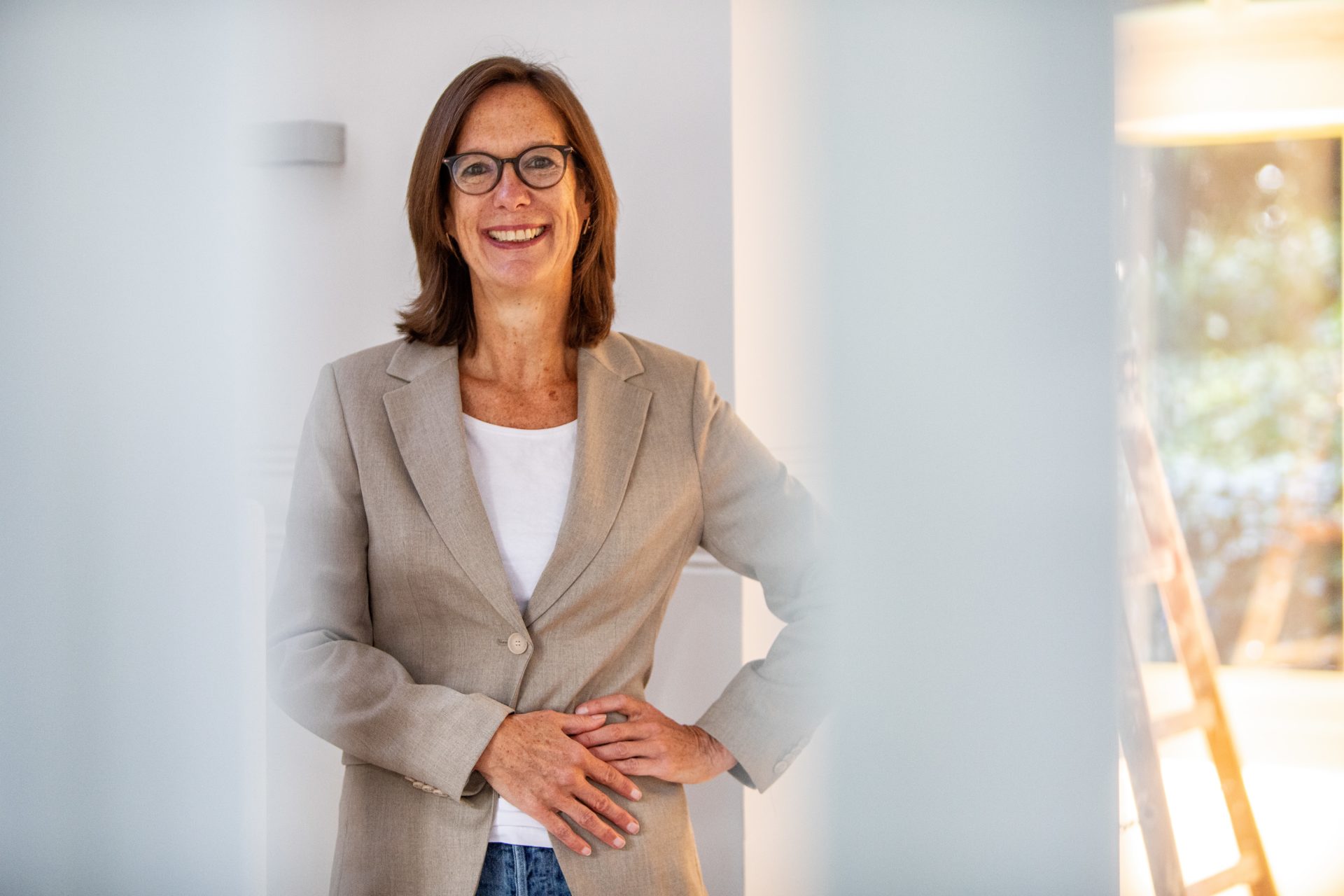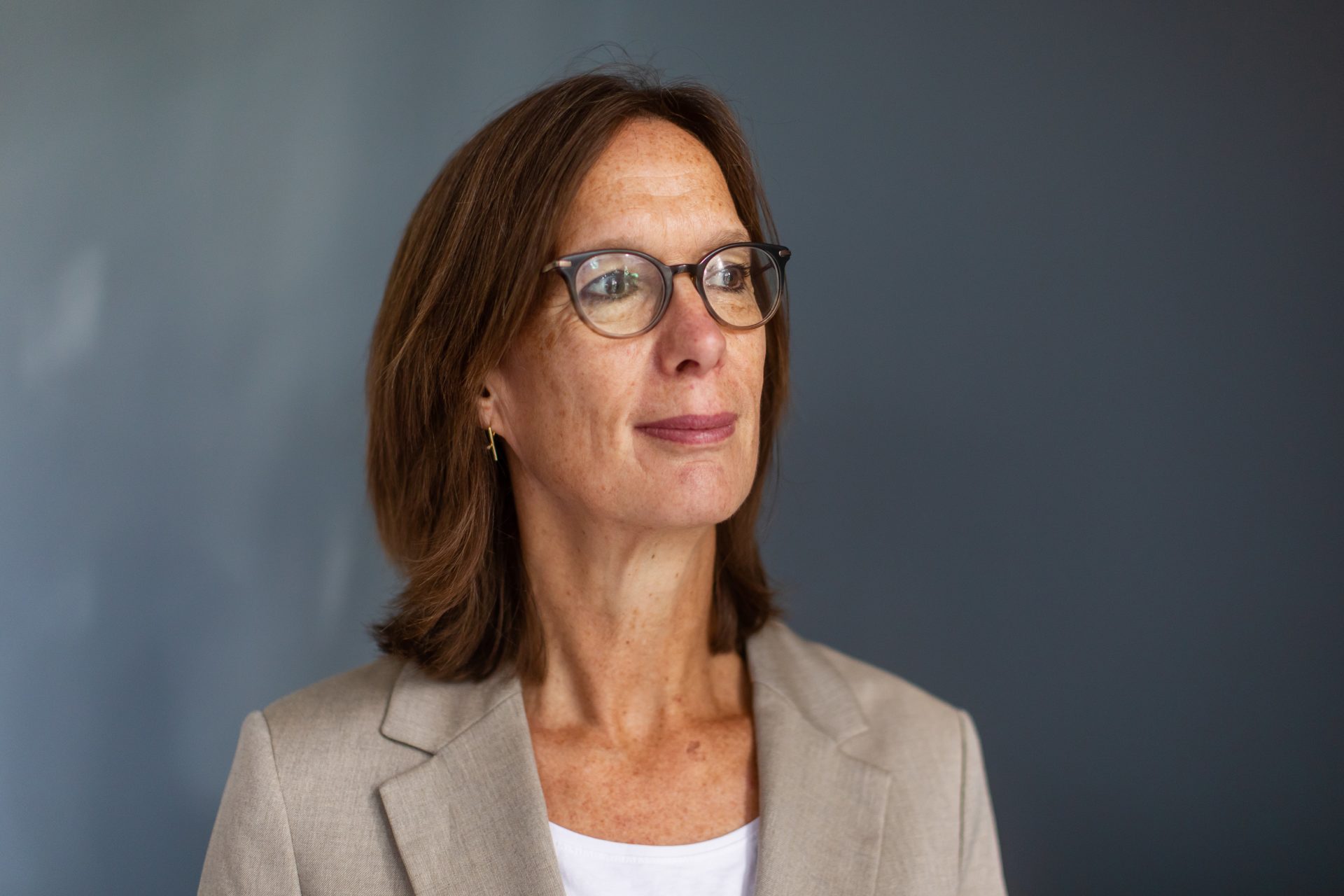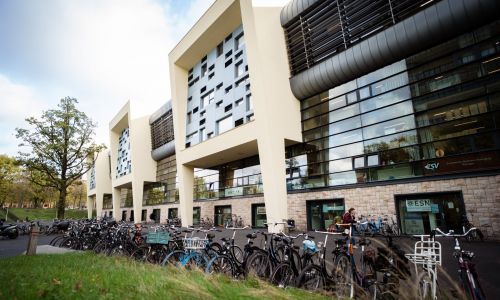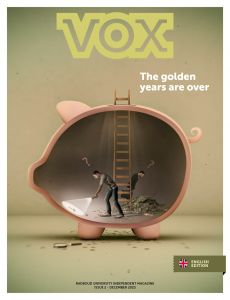Vice President Agnes Muskens wants a zero tolerance policy against undesirable behaviour
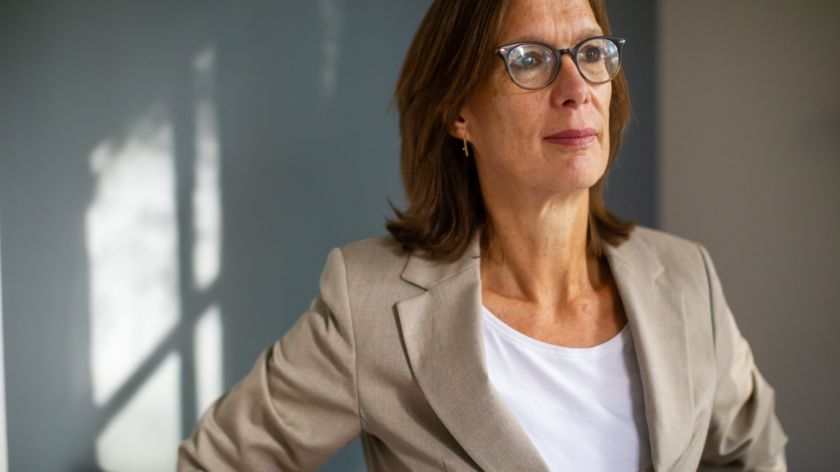 Agnes Muskens. Foto: Dick van Aalst
Agnes Muskens. Foto: Dick van Aalst
Academia is still largely unknown territory for Agnes Muskens. And yet, as Vice President of Radboud University, she has to make important decisions concerning work pressure, social safety, and finances. ‘We have to send a very clear signal if people feel unsafe.’
Agnes Muskens (56) has only visited the Radboud University campus twice. The first time was during the New Year’s Eve gathering, when she introduced herself to her new colleagues and students via a live stream. The second time she was given a tour of the university grounds, which left her filled with a sense of wonder. Wonder about the size of the campus and how green it is, for example. But also about the facilities that researchers have at their disposal.
Terra incognita
Muskens, who was appointed Vice President of Radboud University with effect from 1 January, hopes to hold on to this state of wonder for some time. For the first few months, she mostly wants to listen and observe, she explains from her home office in Bussum.
Her background is in banking and financial services. For the past twelve years, Muskens worked as a consultant for Deloitte, and before that for major banks like ABN AMRO and NIBC. With much pleasure, she emphasises. But when the pandemic broke out, Muskens began to wonder, as she attended one long video call after the other, what she wanted to do with the rest of her working life. To answer this question, she took a sabbatical.
‘I found myself wondering: Am I still in the right place?’
And now she is the newest member of the Executive Board, successor of Wilma de Koning, who recently relocated to the Royal Netherlands Academy of Arts and Sciences (KNAW). The fact that Radboud University is still terra incognita for Muskens is something she sees as both an advantage and a disadvantage. ‘I can’t do anything on automatic pilot yet, which means that things cost more energy.’ At the same time, she has a fresh perspective on decisions made in the past, such as the university’s decentralised organisation, with faculties having a great deal of autonomy. ‘I’m used to working in an environment with more central control.’
Why did you decide to leave Deloitte?
‘At Deloitte, I was surrounded by young, enthusiastic people with an incredible drive. I really enjoyed that. And yet, I found myself wondering: Am I still in the right place? This was partially due to the commercial pressure: constantly having to score financially on large projects.’
‘This was why I decided to take a sabbatical. It was not an easy decision. Then, in June, I was approached by a head-hunter for this position at Radboud University.’
Why did it take you so long to start?
‘I have had many introductory meetings. With the Rector, the President of the Board, the Supervisory Board, the appointment committee, the deans, and the participational bodies. I was immediately confronted with the phenomenon of participation. These were all good conversations. Everyone was very down to earth. They said: Of course, you have no experience working at a university, but we’ll help you. I increasingly felt that these were people I could really work with.’
You probably had to compromise when it came to your salary, since the salary of university administrators is capped by law.
‘I knew this beforehand, and it was never a reason not to do it. For me, the most important thing right now is to do work I enjoy, in a friendly work environment, with a social impact.’
How do you see the financial situation of Radboud University?
‘We should be very pleased with the health of our finances – we have a strong basis. In the past, the university was always very cautious with its finances, so now we have room to hire extra staff, and in this way lower work pressure.’
‘Diversity can also be a matter of thinking differently’
‘The university funding model is incredibly complex; it will take me some time to figure out all the funding flows. But my background is an excellent basis for this.’
In your first meeting with the participational bodies, diversity was immediately on the agenda. You indicated that this is something you find very important. Why?
‘A diverse staff composition is crucial. It’s good for the creativity, output and atmosphere. But diversity cannot always be captured in categories. It’s about gender, skin colour, background and religious beliefs. This is also what makes this discussion difficult: there’s a lot we don’t know about our staff, and we’re not allowed to ask. The answer may be in taking a different perspective, or adopting a different style.’
Some call the university a leftist stronghold. And many people here are white.
‘On the other hand, we have a lot of first-generation students, and we attract a lot of students from the region. That too is diversity. The university’s past also determines its present, which brings many gifts.’
The university expressed the ambition of having 36% of female professors by 2025. As it stands, they only represent 30%, and their number has essentially stopped growing. What do you plan to do about it?
‘This figure of 36% is based on the faculties’ own ambitions, and it is something I absolutely want to hold on to. As far as I’m concerned, we can also aim for 40% by 2025, although this may be difficult to achieve by now.’
‘The first step is to create more awareness by entering into dialogue with the deans. What are we going to do about it? What interventions can we deploy to get the percentage growing again? I think that by adopting a different perspective, we can take important steps.’
How?
‘For example with a broader formulation of the job profile in our vacancy texts, as is already being done at the Faculty of Science. Not by thinking from within the conventional framework, but by daring to take the risk of appointing someone with less experience, but enough potential.’
Women should also feel safe at work. Is their safety sufficiently guaranteed at the moment?
‘It’s hard for me to say anything about the past. I wasn’t there. We’re currently working on a revised version of a university-wide code of conduct. I feel that this is a very important document, but it’s still only words on a page. We also need to embody it, by continuously asking ourselves: how are we treating each other? We also recently appointed an ombudsperson; it’s important that people know where to find her.’
‘Nine out of ten times, an arm around your shoulders is OK, but the tenth time it’s not’
‘Ultimately, we are a mirror of society, so we will also be faced with behaviour that is unacceptable. We need to respond with a zero tolerance policy.’
You were handed the dossier concerning the violation of norms at the Faculty of Philosophy, Theology and Religious Studies. What will you do about Paul Bakker, who was supposed to be appointed Dean, and is now not allowed to teach?
‘To make sure that this dossier is handled with due care, we decided that the Rector would deal with it, together with the Faculty Board, basically continuing what he started. This case is so complex and nuanced, that it would not be a good idea for me to do it now.’
What do you mean by the zero tolerance policy you just mentioned?
‘I believe that as Executive Board, we have to send a very clear signal when people feel unsafe.’ The recent developments around The Voice of Holland brought this once more to my attention. John de Mol had a talk with band leader Jeroen Rietbergen (in response to a 2019 complaint, Eds.), following which Rietbergen promised to behave. I think that De Mol must still be wondering what happened. This kind of ‘wisdom after the event’ is crucial – also for people at the university. We cannot tolerate this kind of behaviour.’
‘The Netherlands is very different in this respect from places like the US, for example. There, a man would never step into a lift occupied by a woman alone – he would simply wait for the next one. People never touch each other. We are more friendly, more convivial. We sometimes put an arm around someone’s shoulder. Nine out of ten times, it’s OK, but the tenth time it’s not. This is something we need to talk about. Not only as supervisors, but also within teams.’
Mind shift
Like many people, Muskens discovered the joys of walking during the pandemic. During her sabbatical, she left her home in Bussum to go on long hikes a few times a week. ‘I never knew how beautiful and diverse the Netherlands is. Now that I work full-time, I really miss it.’
‘The only benefit of COVID-19 is the mind shift it brought in our attitude to work. Many people want to find a better balance between work and private life. The freedom to work at home or at the university is a great good.’
‘I understand the resistance, but flexwork also has advantages’
‘Don’t get me wrong: for many people, working from home is hard, with children at home, and the lack of social contact. We would also have preferred to conduct this interview on campus. It’s nice to be able to make eye contact. This is something we’ll need to find a balance in. It’s not yet fully crystallised.’
Some employees are afraid that they will no longer have a nice workplace on campus, because of the new flexible and hybrid work forms.
‘I understand that very well. I come from an environment where flexwork was introduced, and there was a lot of resistance to it. As long as there are enough opportunities to withdraw into a quiet working space, or find a place to have a private chat, open-plan offices do offer added value. You see more, and you hear more of what goes on among your colleagues. Especially in combination with part-time working from home, I think it works really well.’
‘This has been my experience so far, but that doesn’t mean it’s where we’re headed as a university. The resistance is logical, but flexwork also has advantages.’
You are currently still working from home because of COVID-19. What will happen once the Dutch government retracts its work from home advice?
‘I will continue to work from home one day a week. The other four days I plan to commute to the campus. The two times I visited the campus, I immediately ran into people I had previously only met via Zoom. It’s an entirely different type of interaction.’
What can we hold you accountable for a few years from now?
‘I think it’s too early to list personal priorities, but by the time I leave, in four or eight years – hopefully eight – I hope I will have made my contribution to this beautiful institution. In the coming months, I mostly hope to hold on a bit longer to this state of wonder.’
